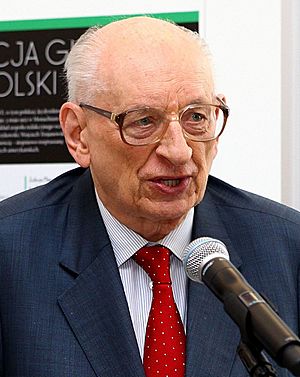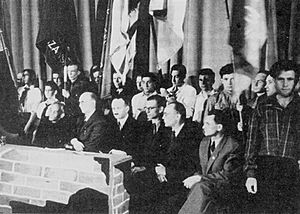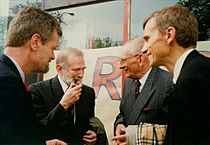Władysław Bartoszewski facts for kids
Quick facts for kids
Władysław Bartoszewski
|
|
|---|---|
 |
|
| Minister of Foreign Affairs | |
| In office 30 June 2000 – 19 October 2001 |
|
| President | Aleksander Kwaśniewski |
| Prime Minister | Jerzy Buzek |
| Preceded by | Bronisław Geremek |
| Succeeded by | Włodzimierz Cimoszewicz |
| In office 7 March 1995 – 22 December 1995 |
|
| President | Lech Wałęsa |
| Prime Minister | Józef Oleksy |
| Preceded by | Andrzej Olechowski |
| Succeeded by | Dariusz Rosati |
| Ambassador of The Republic of Poland to Austria | |
| In office 20 September 1990 – 1 September 1995 |
|
| Preceded by | Stanisław Bejger |
| Succeeded by | Jan Barcz |
| Personal details | |
| Born | 19 February 1922 Warsaw, Poland |
| Died | 24 April 2015 (aged 93) Warsaw, Poland |
| Cause of death | Myocardial infarction |
| Spouse | Zofia Bartoszewska |
| Children | Władysław Teofil Bartoszewski |
| Occupation | Academician, journalist, politician, resistance member, social activist, writer |
Władysław Bartoszewski (19 February 1922 – 24 April 2015) was a very important Polish person. He was a politician, a social activist, a journalist, a writer, and a historian. During World War II, he was held as a prisoner in the Auschwitz concentration camp. After his release, he became a brave fighter in the Polish underground resistance and took part in the Warsaw Uprising.
After the war, he faced difficulties and was put in prison by the communist government of Poland. This was because he was part of the Home Army and opposed the communist rule.
When the communist government ended, Bartoszewski became the Minister of Foreign Affairs twice. He also served as an ambassador and was a member of the Polish Senate. He was a close friend and supporter of Lech Wałęsa, who later became president of Poland.
Bartoszewski received many honors, including the Order of the White Eagle, which is Poland's highest award. He was also made an honorary citizen of Israel.
Contents
Early Life and Education
Władysław Bartoszewski was born in Warsaw, Poland, into a Catholic family. He went to Saint Stanisław Kostka Secondary School. In 1939, he finished high school at The Humanist High School of the Roman Catholic Future Educational Society in Warsaw.
World War II Experiences
In September 1939, when World War II began, Bartoszewski helped defend Warsaw. He worked as a stretcher-bearer for the civil defense. From May 1940, he worked at a social clinic for the Polish Red Cross in Warsaw.
On 19 September 1940, he was arrested in Warsaw during a surprise police raid. He was then sent to Auschwitz concentration camp on 22 September 1940. His prisoner number was 4427. Thanks to the efforts of the Polish Red Cross, he was released from Auschwitz on 8 April 1941.
Joining the Polish Underground

After leaving Auschwitz, Bartoszewski joined the Association of Armed Struggle, which later became the Home Army (AK). This was the largest resistance movement in Poland. In 1942, he joined a secret Catholic organization called the Front for the Rebirth of Poland.
From 1941 to 1944, Bartoszewski secretly studied Polish studies at Warsaw University. At that time, the German authorities had made it illegal for Poles to get higher education.
In August 1942, Bartoszewski became a soldier in the Home Army. He worked as a reporter and used the secret name "Teofil."
Helping Jewish People
From September 1942, Bartoszewski worked with a group called Żegota. This was a Polish World War II resistance organization. Its main goal was to help Jewish people during the Holocaust. Żegota was supported by the Polish Government in Exile. Bartoszewski remained a member of Żegota until the Warsaw Uprising.
He also helped organize aid for those fighting in the Warsaw Ghetto Uprising in April 1943.
Warsaw Uprising and Recognition
On 1 August 1944, Bartoszewski took part in the Warsaw Uprising. He helped with radio communications and edited a magazine called The News from the City and The Radio News.
For his bravery, he received the Silver Cross of Merit on 20 September 1944. On 1 October, he was promoted to Second Lieutenant in the Home Army. He also received the Cross of Valor on 4 October.
After World War II
After the Warsaw Uprising, Bartoszewski continued his underground work in Kraków. In February 1945, he returned to Warsaw and joined another resistance group called NIE. On 10 October 1945, he officially revealed that he had served in the Home Army.
In late 1945, Bartoszewski started working with the Institute of National Remembrance. He shared important information he had gathered during the war about Nazi crimes, concentration camps, and the genocide of Jewish people.
Facing Communist Rule
In February 1946, Bartoszewski began working for Gazeta Ludowa (People's Gazette). This was the main newspaper of the Polish People's Party (PSL), which was the only major party opposing the communist government. He wrote articles about heroes of the Polish Underground State and the fight for Poland's freedom.
Because of his work with the PSL, Bartoszewski was targeted by the communist security services. On 15 November 1946, he was arrested based on false accusations. He was held in Mokotów Prison and released in April 1948.
He was arrested again on 14 December 1949. In May 1952, he was wrongly sentenced to eight years in prison for false charges. He was moved to different prisons and finally released in August 1954 due to poor health. In March 1955, during a time of political change, it was confirmed that he had been wrongly sentenced.
Career and Activities
After being released from prison and cleared of charges, Bartoszewski returned to journalism. He worked as an editor for various publications. In August 1957, he started working with Tygodnik Powszechny (Universal Weekly), a respected Catholic magazine.
In November 1958, he tried to continue his studies at Warsaw University, but he was expelled in October 1962.
International Recognition and Work
On 18 April 1963, Bartoszewski received the Polonia Restituta medal for helping Jewish people during the war. This award was suggested by the Jewish Historical Institute.
Later that year, he visited Israel at the invitation of the Yad Vashem Institute. There, he received the diploma of the Righteous Among the Nations on behalf of the Council for Aid to Jews. In 1966, he personally received the medal of the Righteous Among the Nations.
Bartoszewski traveled to many countries, including Austria, Germany, Great Britain, Italy, and the United States. He connected with Polish people living abroad and gave lectures. From 1973 to 1982, he taught modern history at the Catholic University of Lublin (KUL).
He also lectured at universities in Germany, including the Ludwig-Maximilian University in Munich. In 1984, he received an honorary doctorate from Hebrew College in Baltimore, USA.
Bartoszewski was a member of the Józef Piłsudski Institute of America and helped lead the Institute of Polish-Jewish Studies at the University of Oxford. He took part in many international meetings about World War II, the Holocaust, and relations between Poles, Germans, and Jewish people.
Opposing the Communist Government
In the 1970s, Bartoszewski was not allowed to publish his works in Poland because he opposed the government. He also faced searches and was denied a passport.
In January 1976, he was one of the first to sign a letter from intellectuals protesting changes to the Polish constitution. He also helped create the Society for Educational Courses and taught at the "Flying University," which was a secret, unofficial university.
In August 1980, Bartoszewski signed a letter supporting workers who were protesting on the Polish coast. He became a member of the Solidarity movement. When martial law was declared in December 1981, he was arrested and held in prison. He was released in April 1982 thanks to support from people in Poland and other countries.
He was even offered the position of President of Poland in exile twice, but he politely declined.
Public Service in Free Poland
Diplomatic and Political Roles
From September 1990 to March 1995, Bartoszewski served as the Ambassador of Poland to Austria. In April 1995, he gave a special speech in Germany to mark the 50th anniversary of the end of World War II. He was the only foreign speaker invited.
He became the Minister of Foreign Affairs again from March to December 1995, and then from 2000 to 2001. From 1997 to 2001, he was a Senator and led the Office for International Affairs and European Integration. In November 2007, he became Secretary of State in the Prime Minister's Office, focusing on international affairs.
Social and Academic Contributions

Bartoszewski was the chairman of the International Council of the National Auschwitz Museum starting in June 1990. He also worked to improve relations between Poles and Jewish people, and Poles and Germans. He helped keep alive the memory of the Polish Underground State, the Warsaw Uprising, and the terrible crimes of totalitarianism.
He received an honorary doctorate from the University of Wrocław in 1996. In 2005, he gave a speech at the 60th anniversary of the liberation of Auschwitz-Birkenau, representing Polish concentration camp prisoners.
Even though he didn't have a university degree, Bartoszewski taught history at several respected universities. He was known for his deep knowledge and wisdom. In 2008, the John Paul II Catholic University of Lublin awarded him an honorary doctorate.
Władysław Bartoszewski is remembered for his important role in building strong relationships between Poland and Israel. He believed that true love for one's country means avoiding hatred and intolerance.
Family Life
Władysław Bartoszewski was married twice. His second marriage was to Zofia Bartoszewska in 1967, and they remained married until his death. His son, Władysław Teofil Bartoszewski, born in 1955, is also a historian.
Bartoszewski passed away on 24 April 2015, at the age of 93, due to a heart attack. He was buried at Powązki Military Cemetery in Warsaw.
Awards and Honors
Bartoszewski received many awards and honors throughout his life for his bravery, his work for peace, and his efforts in reconciliation. Some of them include:
- 1944: Silver Cross of Merit with Swords and the Cross of Valor
- 1963: Knight's Cross of the Polonia Restituta
- 1965: Righteous Among the Nations
- 1981: Honorary doctorate from the University of London
- 1983: Herder Prize, Vienna
- 1984: Honorary doctorate from the University of Baltimore
- 1986: Peace Prize of the German Book Trade
- 1995: Knight of the Order of the White Eagle (Poland's highest honor)
- 1995: Grand Decoration of Honour in Gold with Sash for Services to the Republic of Austria
- 1996: Heinrich Heine Prize of the city of Düsseldorf
- 1997: Grand Cross with Star of Merit of the Federal Republic of Germany
- 2006: Knight Grand Cross of the Order of St. Gregory the Great (a high papal award)
- 2009: Commander of the Legion of Honor (France)
- 2013: Elie Wiesel Award
- 2015: Honorary citizen of Israel
Images for kids
See also
 In Spanish: Władysław Bartoszewski para niños
In Spanish: Władysław Bartoszewski para niños
 | Emma Amos |
 | Edward Mitchell Bannister |
 | Larry D. Alexander |
 | Ernie Barnes |


